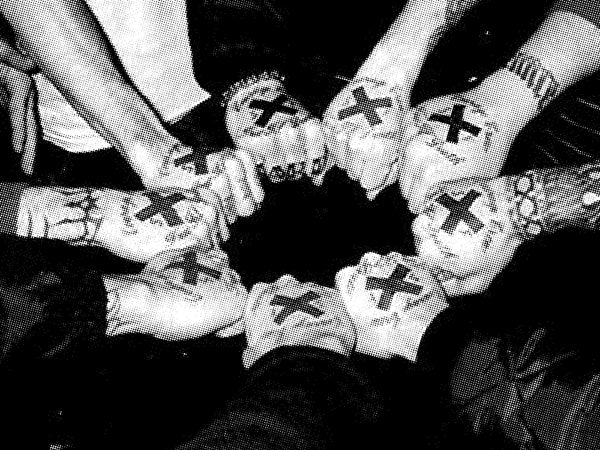
You may have decided to give up drinking for a while, or maybe you had a bad experience with addiction and it's time for you to embrace sobriety. In seeking out support, or talking to people you know about clean living, sobriety, and addiction, you may have discovered that there are communities of like-minded individuals available to join. Some of these include the International Conference of Young People in Alcoholics Anonymous (ICYPAA), the Recovery community, and the Straight Edge community.
On their surface, communities like ICYPAA, Recovery, and Straight Edge may seem fairly similar. Are they not all communities of young people celebrating their sobriety together?
Each community has their own value system, traditions, and history. The community that we have embraced is the Straight Edge community. And if you feel that being a part of the Straight Edge community is for you, then you should understand what it truly means to be Straight Edge. For you, we've compiled this guide on How To Be Straight Edge, from knowing what it means to be a member of this community, to knowing what kind of challenges you can expect down the road.
Value the ideals of the Punk community
Straight Edge has its roots in the punk community. It was in the punk rock community that Straight Edge was given its voice, and the support that it needed to grow and spread. So a key part of understanding what it means to be Straight Edge, is to understand what it means to be punk.
The punk community was a reaction to spread of civil society's complacence and complicity in the acceptance of both corporate governance and the military-industrial complex. The punk community values inclusion, artistic expression, and both resistance against and rejection of the values of mainstream society.
To value the ideals of the punk community is to understand how necessary the punk community has been - think about everything that is wrong with the world, and how little has been done to create change. The punk community has decided that instead of trying to be part of the system, and trying make change from the inside, they would make their own system. Punks supporting punks through music, art, education, commerce, agriculture, and activism.
Understand the history of the Straight Edge community
When punk first began to spread, figures both within and outside the community declared a manifesto about what it meant to be a true punk. One of the core requirements was a dedication to nihilist self destruction - essentially, that substance abuse was a core requirement of the authentic punk identity. Young punks continually tried to prove how punk they were by how self-destructive they could be - drinking heavily, snorting drugs, and huffing gas, carving words into their own bodies. They were convinced that the best way to be a true authentic punk was to live like their own lives were meaningless.
All around the United States, people disagreed, but nothing came of it. Likewise, this did not sit well with Ian Mackaye. Mackaye understood himself to be a punk - a freak, someone who didn't fit in with society, who valued the same ideals as the punk community that he knew. But he refused to accept that nihilist self destruction and substance abuse were necessary in order to be an authentic punk rocker.
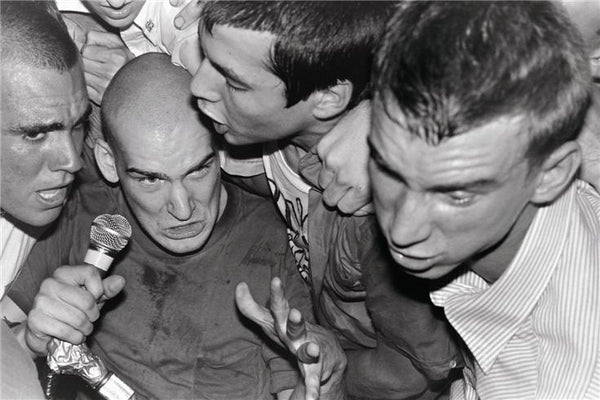
Ian Mackaye of Minor Threat
In 1981, with the release of the song "Straight Edge" by his band Minor Threat, Mackaye used his lyrics to explain his case. That he too was a punk (I'm a person just like you), but that he had no interest in getting drunk or high (I've got better things to do).
The song, the record, and the subsequent tours by Minor Threat galvanized a pre-existing sentiment among others in the punk community. This sentiment motivated the formation of a new subculture known as the Straight Edge community.
Understand your history, but support the future
The Straight Edge community has existed for nearly 40 years. In that time, many members of the Straight Edge community have been inspired to write and record music on their experience being Straight Edge. Deep respect must be shown for what these bands and musicians had to go through just to be able to make records, to tour, and to inspire others.
Likewise, their contributions have been instrumental in spreading awareness of and dedication to the Straight Edge community, and should be respected for their part in keeping the Straight Edge community alive and vibrant for those that came after.
Some of this music has come to be revered as holy, or sacred. And some of it is out of touch with the world we live in today - espousing homophobia, misogyny, or violence against those that struggle with addiction. Furthermore, it is a sad truth that many of the people that have created some of the most revered Straight Edge records of the past are no longer Straight Edge. In fact, many of them disparage their time being Straight Edge as a mistake of their youth.
It is with this in mind that our history should be viewed. It is true that many members of our community are still here, and have never stopped making significant contributions to our community. Since day one, they have helped grow our community, and their dedication has never wavered.
However we should never become so beholden to the bands and musicians that gave up on us and our community, that we ignore the contributions that young people and bands are making now. Young people and bands are our future, and without them, the Straight Edge community will be lost to history. So support young bands - if their music is important to you, then buy their music, buy their merch, go to their shows, and let them know. Give them the help they need to inspire the next generation.
Recognize that you are identifying as a member of a community that has had issues with Neo-Nazis
Fascist and Nazi ideologies have no place in the Straight Edge community. As a subculture within the punk community, so too must the Straight Edge community be open to people of all races, creeds, colors, and sexual orientations. Racism, sexism, homophobia, and fascism have no place in the Straight Edge or punk scenes.
Our tenets (no drinking, smoking, drugs) have been appropriated by right wing fascists and Neo-Nazis to support their combat training. They view drug addicts and alcoholics as "degenerates", unworthy of their empathy.
To the outside world, it's understandable how we could be perceived as supporting right wing fascists, racists, and Neo-Nazis. Many people see the ideals of the Straight Edge community as inherently fascist because we live by a code. And you should expect to be challenged by people who will assume, suspect, or accuse you of either supporting Neo-Nazis, or being a Neo-Nazi. In territories with a history of Neo-Nazi violence, law enforcement may suspect anyone wearing Straight Edge clothing or having Straight Edge tattoos as being a Neo-Nazi.

National Socialist Straight Edge Racists
Being Straight Edge means knowing how to manage this eventuality. It means knowing how to respond to people that accuse you of being a racist, a fascist, or a Neo-Nazi: that Neo-Nazis have appropriated our ideals for their own use, and that racists aren't welcome in our community. Because they aren't - many members of the Straight Edge community are actively involved in anti-racist and anti-fascist organizations that fight Neo-Nazis at every opportunity. And many members of the Straight Edge community have been injured or killed in violent confrontations while attempting to keep the hardcore and punk community free of Neo-Nazis.
Recognize that you are identifying as a member of a community that has had issues with gang violence
Hardcore punk music has always been the music of street youth. And street youth have found protection and power in street gangs, especially in cities with a long history of street gangs, such as Boston and New York City. Street gangs provided young people in the hardcore and punk scenes with the means to protect themselves in areas where criminal gangs operated. Street gangs also made way for the creation of crews, who used violence to keep drug dealers and Neo-Nazis out of hardcore and punk shows, venues, and hangouts.
As a result of the crews and violence, Straight Edge has been registered as a gang. In some localities, Straight Edge clothing is considered gang clothing and has been banned at schools or in public spaces. In areas with a history of violence, wearing Straight Edge clothing may result in harassment by law enforcement officers.
Being Straight Edge means knowing that harassment by law enforcement is a possible outcome of wearing Straight Edge apparel, or displaying Straight Edge tattoos.
Recognize that addiction is a real issue
If you are currently in recovery, or if your sobriety has only come about as a result of rehab, then you're very familiar with the destructive power of chemical addiction. Perhaps you've seen its impact on a family member or close friend.
For many people that choose sobriety, they don't have experience with addiction up close. They say things like "Why don't they just stop", or "If it was me, I'd just stop drinking / getting high". Or "Drugs are for losers".
Meanwhile, the United States is under an opioid epidemic: with only 5% of the world's population, the country consumes 75% of opioids produced in the world each year. So much money is being made, that it's enabled producers to weaken industry oversight, leading to more consumption. We live in a society that is designed to both create and cash in on addiction.
There are an infinite number of ways people come to addiction, with many self-medicating as a replacement for insufficient mental health services, or as pain management. Dr. Gabor Maté, an addiction researcher, social services worker, and addiction expert, has spent 20 years working in addiction. His research has found a causal link between serious addiction and childhood trauma.
Every time you characterize an an addict as a loser, lowlife, or degenerate, it says more about you, and how sheltered your life has been. So don't do it!
Don't take it personally
Being Straight Edge is a personal commitment. It's not information that you're ever obligated to share with any person you meet or interact with. However, there will be situations where it benefits you to communicate to people you're with that you don't drink, that you don't smoke, that you're Straight Edge.
Some people will take statements you make about yourself to automatically imply that you're better than them, and it could make them defensive. Because, of course, why else would you mention it?
Understand now that this is a natural reaction, so don't take it personally. More than likely, you've hit a sore spot, something that they're a little insecure about. Because after all, they think they're wonderful, why wouldn't someone want to be just like them? And you're making a conscious effort to let them know that you're not like them, and you never will be? Even your motives for bringing it up will be viewed with suspicion.
A common response is that you'll drink or smoke one day. Once again, don't take it personally - they are projecting. Because they couldn't imagine going their entire lives without smoking, or drinking at least once. So how could anyone else?
Don't let it get you down
As you proceed through your sober life, you will discover two hard truths.
The first hard truth is that many of your prior relationships relied on substance usage as their foundation. An obvious one is everyone that you used to hang out with at the bar each weekend. If you aren't going to the bar anymore, they probably won't want to hang out with you anymore. Maybe you guys used to get hangover brunch on Sundays too. Don't expect to be invited anymore. Same thing with your camping friends - if most of what you did consisted of hanging out and drinking beers, you may be surprised to find out that these friends don't consider you fun enough to hang out with anymore, even if you still think you're fun.
The most surprising relationships might be the people you consider your best friends. This one's a bit trickier - your decision to pursue sobriety can often come to feel, to them, like a betrayal of the values that they thought you had in common. They may even need time to grieve for the death of the old version of you before they will be willing to have a relationship with you. It just takes time for people to figure out what's really important to them - having the new version of you in their life, or to never have to question their own values. In the meantime, you have to focus on what’s right for you. And if you've made the decision to pursue sobriety, focus on that - sobriety is challenging enough without other people's expectations dragging you down.
The second hard truth is that it can be can be harder to form new relationships without substance usage. It’s amazing how it makes us outsiders, and it may cut us off from some opportunities, breaks, or favoritism that may be available to people that are considered “the norm” or “down” because of their lifestyle choices.
If you're young, and in school, this can be even more challenging because you could be different from pretty much every person you view as worth knowing in your school. But school is smaller than you realize - you're not obligated to be friends with people just because you're in the same school. Just because you’ve been put in the same class together, doesn’t mean you have anything real in common. Hang out with people with similar interests (BMX, rock climbing, skateboarding, art, music), and form real friendships based around what you like to do. Get active in your scene, get a band going, and spend your summers on tour. High school is short compared to life; it ends eventually. And the people you meet by looking for friendships outside your school will all be a little bit older, a little bit wiser, and a whole lot cooler than anyone you're in school with anyways.
Don't ever believe that there are different levels or "classes" of being Straight Edge
Recently there have been discussions that there is a new class of Straight Edge people that call themselves "Pure edge" - people that have never drank alcohol, smoked, or taken any type of drug. That somehow never experiencing inebriation, intoxication, or addiction makes them more authentically Straight Edge.
Do not fall for it. Hopefully you can see how ridiculous this is - the only thing they've earned is naiveté about how addiction works and how difficult it is to overcome. The only people that could possibly believe that they are better than other people because of their complete lack of experience or understanding of an important part of our community? More likely they deserve our pity rather than our respect or admiration.
Don't be a jerk
Years ago, a wrestler with the stage name CM Punk (real name Phil Brooks) rose to fame in the WWE as a villain by playing up the fact that he was Straight Edge. His shtick involved being a complete jerk and telling everyone that being Straight Edge "means I'm better than you."
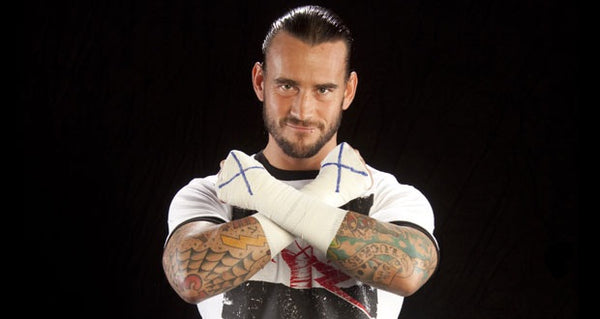 Straight Edge Wrestler CM Punk
Straight Edge Wrestler CM Punk
This notion that Straight Edge makes you better than other people, it's definitely easy to feel that way as you navigate high school or the college scene, and see what alcohol and drugs make people do. Well here's some hard truth: there are plenty of Straight Edge people that are complete failures and plenty that are total losers. And you could be one of them. So don't let it go to your head.
Nobody wants to hang out with someone who constantly reminds them that they're inferior because they drink, or smoke. So don't be a jerk! Or do be a jerk, and enjoy spending every Saturday night of your life home alone giving yourself a congratulatory pat on the back for how awesome you are.
Support your community
As time goes on, you'll learn more and more about how to deal with the challenges of being Straight Edge. A great way to support your community is to share your experiences, and how you learned to manage them, with members of the Straight Edge community. If you have an experience that you would like to share, leave a comment below.
If you would like more information about the Straight Edge community, check out the SXEWORLDWIDE Reading List for a number of books on the Straight Edge and Punk Rock communities.




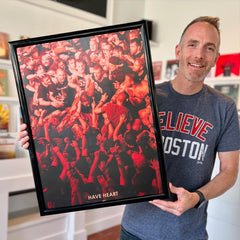
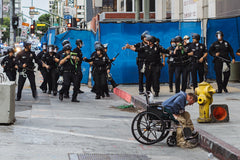
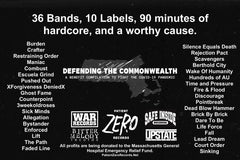
Amazing article. Thank you!
I am a long term member of this community. but i messed up.
anyone that thinks of giving up being straight edge, i hope you read this. i was straight edge all my life. but surrounded by drug abuse, alcoholism, violence, racism, gang life, crime, etc.
my own family members, friends, etc.
i would always steer clear of that garbage because “i was smarter than that” & had the benefit of seeing what it had all done to everyone around me.
& then i met this girl.
this girl was great. (at first)
we would even go to shows together which was rare for me to find this kind of girl my area.
but it went bad.
i had an accident which took me out of work for a year, had a friend take their own life, ended up homeless, my family tore apart, and this girl who was so great, was jot straight edge but we always respected eachothers lifestyles.
until she didn’t & in turn, i didn’t. she offered me a drink ome night when i was down.
i took it.
and then more.
and then more.
and then more.
it soon got out that i was drinking.
all those friends & family members, suddenly had an interest in having me around more.
offering me drugs.
all kinds.
i did it all.
i became this violent, agressive, addict & alcoholic who had no respect for anyone, anything and no self respect.
for a few years this bullshit carried on.
until one night in december of 2018 where me & that great girl i mentioned, got into a HEATED argument (while intoxicated)
me, having no care for anything decided “naaah F**k this” & i jumped off my 3rd story balcony, bursting both my lungs, breaking all my ribs on the left side, breaking my pelvis in half, breaking my collar bone in 3 parts, broke my left arm, broke my neck, my teeth went through my bottom lip, & i bit my tongue almost completely in half. lucky to still be alive, i was hospitalised for quite some time.
and when they were feeding me painkillers i had a moment where i knew what had caused all this.
it was the drugs, the drink, the influence from outside which i let in. i told them no more pain killers. i forced myself to suffer through the pain of what the decisions i made had caused.
and until this day in november 2024 i have gone back to my straight edge ways. which means so much more to me than it ever could have before because now i have not only seen how that rubbish impacts others, but i’ve experienced for myself how badly it can destroy you.
so please.
use your brain.
abstain. resist. refrain.
I’m 59 years old – went to a really partying high school in PA, and have never drank a beer, smoked anything or done drugs. I met a straight edger in art school in Pittsburgh, and was intrigued how cool he was – and how he had the same ideas as me… he was an early straight edger, and was cool as hell. It inspired me to continue my journey….still to this day, I’m living clean. Thanks for the article…it enlightened me on the movement, as I never truly knew what it was all about.
This really speaks to me and my lifestyle and philosophy with punk. I am from Boston and my only understanding was in terms of FSU and so terrified that I never researched this to be honest. I also lived in North Beach SF and loved older punks. I am 18 years clean of Heroin, 4 years pot and beer and don’t eat meat, sugar or caffeine. I do want to remember life, I have a tattoo saying that!. But my friends no longer understand or cut me off cause the have become some sort of skin heads. My mom is also Jewish and I have many gay friends. I love Minor Threat, DK and Henry Rollins to start a list! Let me know if my perception is off base or any further reactions X
Thank you for writing this, Dan SW. It’s a very articulate and compassionate statement of what straight edge should mean to those who choose this path.
Leave a comment